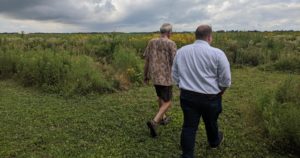 Sen. Bennett visited Kevin Green’s farm outside Fithian, Illinois to learn about farming practices that protect our water and build soil health. Illinois Aqua production manager, Dave Cronke and Prairie Rivers Network Agriculture Programs Specialist, Catie Gregg, joined them to discuss the benefits of conservation agriculture practices have for water quality.
Sen. Bennett visited Kevin Green’s farm outside Fithian, Illinois to learn about farming practices that protect our water and build soil health. Illinois Aqua production manager, Dave Cronke and Prairie Rivers Network Agriculture Programs Specialist, Catie Gregg, joined them to discuss the benefits of conservation agriculture practices have for water quality.
Senator Bennett is the Chair of the Senate Agriculture Committee and comes from a farming family. He has been a leader in introducing legislation in support of conservation on farmland. In this past legislation session, he introduced two bills that support conservation agricultural practices in Illinois, both of which were passed.
The first was SR52, a Resolution in Support of the Nutrient Loss Reduction Strategy (NLRS), a statewide effort to reduce nutrients from running off our fields and into our waters leading to the Gulf Hypoxic Zone.
The second was to add soil health to the enabling legislation of the Soil and Water Conservation Districts (SB1980). While most districts already help farmers improve their soil health, making this officially part of their mission statement elevates this issue where SWCDs have traditionally been known for their work reducing soil erosion and improving water quality.
 Kevin Green has been an advocate for conservation practices and an associate director for the Vermilion County Soil and Water Conservation District (SWCD) for over 25 years. SWCDs provide cost-share and technical assistance to farmers learning new conservation practices through both state and federal conservation programs. The Vermilion County SWCD has been partnering with Aqua Illinois, who provides water for the City of Danville, as they work to improve water in Vermillion County. Recently they applied for a 319 grant from the Illinois Environmental Protection Agency. This grant will allow them to perform a watershed study that will better able them to target conservation in Vermilion County.
Kevin Green has been an advocate for conservation practices and an associate director for the Vermilion County Soil and Water Conservation District (SWCD) for over 25 years. SWCDs provide cost-share and technical assistance to farmers learning new conservation practices through both state and federal conservation programs. The Vermilion County SWCD has been partnering with Aqua Illinois, who provides water for the City of Danville, as they work to improve water in Vermillion County. Recently they applied for a 319 grant from the Illinois Environmental Protection Agency. This grant will allow them to perform a watershed study that will better able them to target conservation in Vermilion County.
Conservation projects on Green’s farm include putting his wettest land in prairie habitat through the Conservation Reserve Program, which pays farmers a rental rate to plant marginal ground with native plants to provide habitat and improve water quality. He says economically he can make more money through that program than farming it, while also providing much needed habitat for wildlife in Illinois.
Green also reduces nutrient runoff by splitting his nitrogen application up and side dressing it in the spring so that it’s available when the plant needs it and has limited ability to runoff into our water. He is growing cover crops on one of his fields, and he recommends starting with just one field, or even part of a field, when trying new practices, something small so you can watch and learn from it without taking on too much risk. He says it takes three to five years and then you start to see the changes in the soil.
Senator Bennett is working to support farmers like Green through state legislation and funding state conservation programs. He feels as other farmers see their successes, more farmers will start incorporating these practices into their operations. Senator Bennett’s visit to this farm is an important step in educating our legislators and helping them advocate for causes they care about.







